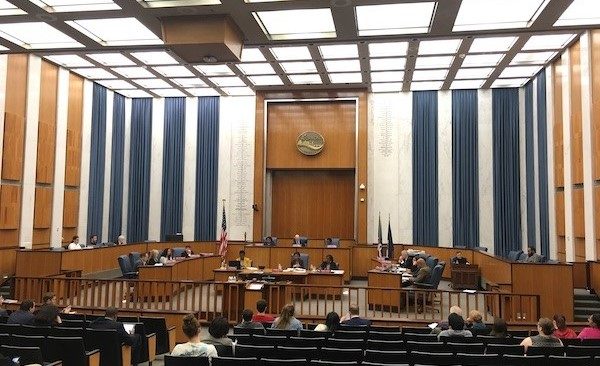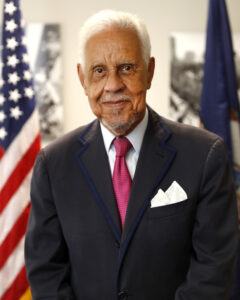Nearly two decades after changing its form of government to the current mayor-council setup, the City of Richmond is mulling potential alterations to its charter that could include a return back to what it had before.
A commission tasked last year by City Council to recommend potential revisions to the 75-year-old charter has completed its review and presented a report that the city released late last week.
The report presents four primary sets of recommendations, including updating the city charter document to give it more clarity; revising the current mayor-council form of government concerning powers and responsibilities of the mayor, council, chief administrative officer and city attorney; and staggering council members’ four-year terms.
The commission also recommends consideration of a change to a council-manager form of government, which Richmond used before it switched to the mayor-council form in 2005. The report stops short of recommending the change, advising instead that it be given consideration in light of a process that would likely involve extensive legal review and a potential advisory referendum put to city voters.
If council desires to pursue that path, the report recommends that it create a new commission or committee specific to the government change by Dec. 15, to allow the time needed for a proposal to come back and a referendum to be held as early as next year and no later than 2026.
The form of government change, which the report states could take full effect by 2029, would reduce the number of seats on council from nine to seven, with the mayor filling one of them and taking part in council business. The city’s magisterial districts would be reduced from nine to six, and the six council members and the mayor would collectively hire a city manager, versus a chief administrative officer, or CAO, appointed by the mayor.
In lieu of such a shift, the commission recommends revisions to the current mayor-council form of government that are aimed at making the mayor a sort of chief executive officer for the city and enhance council’s ability to act as its governing body.
Where the mayor currently hires and fires the CAO, and council hires and fires the city attorney, the commission suggests that both the mayor and council have a say in those positions, considered the top administrative roles for the city.
It also suggests that the mayor be able to appoint and remove department heads, or delegate that to the CAO, and that the mayor provide a monthly public update to council and take questions from each member. Higher compensation for the mayor and council members also is advised.
The report recommends pushing forward those revisions in January so that the so-called mayor-council “partnership model” could take effect in 2025.
Also recommended is a staggering of terms among council members, who currently are elected on the same four-year cycle, and textual updates to the city charter document aimed at making it more legible and reducing potential for confusion or disputes. The document changes would be presented to the 2024 General Assembly, while the staggered terms could be implemented by 2028.
The nine-member commission was appointed last year after council first requested it in late 2021. The request, patroned by Cynthia Newbille, Ellen Robertson and Ann-Frances Lambert, noted numerous amendments that had been made to the charter over the years and the 2005 change to the mayor-council form, which the request described as “unique among the Commonwealth of Virginia’s cities.” A previous charter review commission was formed in 2008.
The current commission’s report states: “The Commission’s aim is to consider how best to implement democratic self-government in the City of Richmond under the City’s current conditions, taking account of both the city’s experience with the current form of government and the numerous changes that have taken place in Richmond from 2004 to the present.”
The General Assembly enacted the current government form for Richmond in 2004 after a citywide referendum in 2003, when, the report states, voters overwhelmingly approved proposals from a private group led by former Richmond Mayor Thomas Bliley and former Virginia Gov. L. Douglas Wilder.
The change, which took effect in 2005, established a directly elected mayor instead of one appointed by council. The mayor is elected by winning five of the city’s nine council districts – an electoral system the report calls “unique” and “designed to protect Black voting power.”
It also established the mayor-council government, in which the mayor acts as CEO by hiring a CAO to run the city’s day-to-day operations. The report states that Richmond’s specific form of government “was and remains unique within Virginia, although numerous cities nationally have similar structural arrangements.”
The first mayor elected under the new system was Wilder, who served one four-year term from 2005 to 2009. The report states that Wilder “regularly called for revisions to the charter with the aim of expanding the formal powers of the mayor,” resulting in several conflicts within City Hall that produced two lawsuits.
In an interview with BizSense in June, Wilder – now a distinguished professor and namesake of Virginia Commonwealth University’s L. Douglas Wilder School of Government and Public Affairs – said he would be opposed to changing Richmond’s government form again.
“One of the reasons we changed the form of government to what it is, what it should have been, was because I concluded that Richmond had become a cesspool of inefficiency and corruption,” Wilder said. “As the old form would require the mayor to be a member of the City Council, he was merely the presiding officer. The City Council would hire a city manager.
“Returning to this form of government, in effect, is saying that the City Council would be running the government because the mayor would be a member of the council. The City Council would hire the manager, and all that the manager would need is a majority vote of the City Council. That’s not what we need,” he said.
“We need someone with experience, with knowledge of government. Right now, the City of Richmond’s school systems rank at the bottom; our crime rates are at the top. Rather than talk about changing the form of government, let’s change some of those people who are in government or in these positions.” Laughing, he added, “I’m 100 percent for that.”
The city’s release said the commission’s recommendations “will be reviewed by Richmond City Council for its consideration and deliberation.” The commission was led by Thad Williamson as chairman and included vice chair Rachael Deane, secretary Antoine Banks, and fellow city residents Bill Echelberger, Kyle Elliott, John Girardi, Travis Gunn, Steven Koski and Daisy Weaver.
The commission’s full report can be viewed here.
Nearly two decades after changing its form of government to the current mayor-council setup, the City of Richmond is mulling potential alterations to its charter that could include a return back to what it had before.
A commission tasked last year by City Council to recommend potential revisions to the 75-year-old charter has completed its review and presented a report that the city released late last week.
The report presents four primary sets of recommendations, including updating the city charter document to give it more clarity; revising the current mayor-council form of government concerning powers and responsibilities of the mayor, council, chief administrative officer and city attorney; and staggering council members’ four-year terms.
The commission also recommends consideration of a change to a council-manager form of government, which Richmond used before it switched to the mayor-council form in 2005. The report stops short of recommending the change, advising instead that it be given consideration in light of a process that would likely involve extensive legal review and a potential advisory referendum put to city voters.
If council desires to pursue that path, the report recommends that it create a new commission or committee specific to the government change by Dec. 15, to allow the time needed for a proposal to come back and a referendum to be held as early as next year and no later than 2026.
The form of government change, which the report states could take full effect by 2029, would reduce the number of seats on council from nine to seven, with the mayor filling one of them and taking part in council business. The city’s magisterial districts would be reduced from nine to six, and the six council members and the mayor would collectively hire a city manager, versus a chief administrative officer, or CAO, appointed by the mayor.
In lieu of such a shift, the commission recommends revisions to the current mayor-council form of government that are aimed at making the mayor a sort of chief executive officer for the city and enhance council’s ability to act as its governing body.
Where the mayor currently hires and fires the CAO, and council hires and fires the city attorney, the commission suggests that both the mayor and council have a say in those positions, considered the top administrative roles for the city.
It also suggests that the mayor be able to appoint and remove department heads, or delegate that to the CAO, and that the mayor provide a monthly public update to council and take questions from each member. Higher compensation for the mayor and council members also is advised.
The report recommends pushing forward those revisions in January so that the so-called mayor-council “partnership model” could take effect in 2025.
Also recommended is a staggering of terms among council members, who currently are elected on the same four-year cycle, and textual updates to the city charter document aimed at making it more legible and reducing potential for confusion or disputes. The document changes would be presented to the 2024 General Assembly, while the staggered terms could be implemented by 2028.
The nine-member commission was appointed last year after council first requested it in late 2021. The request, patroned by Cynthia Newbille, Ellen Robertson and Ann-Frances Lambert, noted numerous amendments that had been made to the charter over the years and the 2005 change to the mayor-council form, which the request described as “unique among the Commonwealth of Virginia’s cities.” A previous charter review commission was formed in 2008.
The current commission’s report states: “The Commission’s aim is to consider how best to implement democratic self-government in the City of Richmond under the City’s current conditions, taking account of both the city’s experience with the current form of government and the numerous changes that have taken place in Richmond from 2004 to the present.”
The General Assembly enacted the current government form for Richmond in 2004 after a citywide referendum in 2003, when, the report states, voters overwhelmingly approved proposals from a private group led by former Richmond Mayor Thomas Bliley and former Virginia Gov. L. Douglas Wilder.
The change, which took effect in 2005, established a directly elected mayor instead of one appointed by council. The mayor is elected by winning five of the city’s nine council districts – an electoral system the report calls “unique” and “designed to protect Black voting power.”
It also established the mayor-council government, in which the mayor acts as CEO by hiring a CAO to run the city’s day-to-day operations. The report states that Richmond’s specific form of government “was and remains unique within Virginia, although numerous cities nationally have similar structural arrangements.”
The first mayor elected under the new system was Wilder, who served one four-year term from 2005 to 2009. The report states that Wilder “regularly called for revisions to the charter with the aim of expanding the formal powers of the mayor,” resulting in several conflicts within City Hall that produced two lawsuits.
In an interview with BizSense in June, Wilder – now a distinguished professor and namesake of Virginia Commonwealth University’s L. Douglas Wilder School of Government and Public Affairs – said he would be opposed to changing Richmond’s government form again.
“One of the reasons we changed the form of government to what it is, what it should have been, was because I concluded that Richmond had become a cesspool of inefficiency and corruption,” Wilder said. “As the old form would require the mayor to be a member of the City Council, he was merely the presiding officer. The City Council would hire a city manager.
“Returning to this form of government, in effect, is saying that the City Council would be running the government because the mayor would be a member of the council. The City Council would hire the manager, and all that the manager would need is a majority vote of the City Council. That’s not what we need,” he said.
“We need someone with experience, with knowledge of government. Right now, the City of Richmond’s school systems rank at the bottom; our crime rates are at the top. Rather than talk about changing the form of government, let’s change some of those people who are in government or in these positions.” Laughing, he added, “I’m 100 percent for that.”
The city’s release said the commission’s recommendations “will be reviewed by Richmond City Council for its consideration and deliberation.” The commission was led by Thad Williamson as chairman and included vice chair Rachael Deane, secretary Antoine Banks, and fellow city residents Bill Echelberger, Kyle Elliott, John Girardi, Travis Gunn, Steven Koski and Daisy Weaver.
The commission’s full report can be viewed here.






We need more folks like Governor Wilder in our back pocket!
For stuff like this? He’s awful!
https://www.washingtonpost.com/local/virginia-politics/college-student-accuses-former-virginia-governor-l-douglas-wilder-of-sexual-harassment/2019/03/28/7d0170c8-3b95-11e9-aaae-69364b2ed137_story.html
The funny part is they (like last time) focus on the functioning system as the problem in Richmond City government. I mean one of the simple changes is having the Mayor attend, give a report, and take/answer questions. Please, they could still give a one-page summary that is beyond vague and answer ever questions with “we will get back to you” statement. The separate legal counsel for Mayor and Council, the change to allow Council to submit budget amendments those are welcome but a change back to a City Manager, giving the Mayor more direct power of department heads, or… Read more »
The City is not part of VRS.
No they are separate but as someone who had both you can consolidated into either and MANY MANY MANY persons who work over their lifetime for both the city and the another locality or state will move the contributions/participations into one. Also contributions for unclassified persons (like the Mayor or the CAO) may be made to either party. VRS has a site (and staff dedicated) to purchasing and moving prior service. It is extremely common.
The City of Richmond is far more secretive then even our military officials in the Ukraine.
If this system elected a Mayor who had experience in running a city government, we wouldn’t have had Wilder, Jones and Stoney. None of them could find the men’s room at City Hall. At least Stoney figured some things out during his first term as he dug us out of a cesspool. Despite his retractors, he’s been the best of the lot. Twice though we could have elected experienced capable politicians in Pantele and Berry but the system is rigged otherwise. We need a system in which the Mayor is elected requiring 51% of the vote. The current system is… Read more »
And may I add Kim Grey to the list of those who could have capably filled the position.
Not sure Stoney was the best of the three; he just got a lot of revenue to spend that helped in some areas. Schools improved…nope. General City Hall processes improved…..barely. Finance Dept issues resolved…not even close. Heck VCUs recent disaster had the best email where VCU said they needed to Public Safety building to go through as this was his administration’s BIGGEST development deal. That is very true; CoStar was the state and Gov Northam. But for sure 51% and 5 of 9 OR a runoff of the top two candidates (or ranked choice voting) should have been included in… Read more »
I agree with you on your entire post, except absolutely NO to ranked choice voting.
Why are you against ranked choice voting?
I agree that this system would work if someone competent was elected. I disagree that Stoney is better than Wilder. Wilder’s problem was that he was the only competent person in very corrupt and rent seeking room.
I like this concept of giving the Mayor less authority. We need to keep the 9 members on City Council. More representation is better – we get better representation, not less – and a more diverse Council.
Also, we do not need to raise their salaries. City Council should be public SERVICE, not a full time job.
I also like that the Mayor can hire/fire – it creates LESS of an administrative state.
Why so against an “administrative state” when you are looking for day to day administrative competency? Create a strong apolitical administrative apparatus governed by a strong representative governing board.
Even if we could agree to this, the politics of Richmond would not allow it yet.
Maybe some day things in Richmond will be run like Germany or Finland, but not soon.
“administrative state” – these people are not elected and should not have so much power over citizen’s lives. oh, and Fed and State workers are NOT competent compared to private sector counterparts.
“Governing Boards” are a joke. it’s like the wolf guarding the hen house.